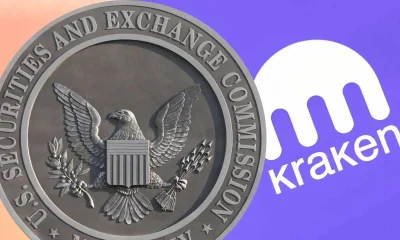
Cryptocurrency
Grayscale Sues SEC Over Bitcoin ETF Application Rejection

Grayscale Investments launched a lawsuit against the Securities and Exchange Commission (SEC) of the United States less than an hour after the SEC denied its application to convert its flagship Grayscale Bitcoin Trust product to an exchange-traded fund (ETF).
iexclusivenews reports that SEC rejected Grayscale’s application earlier Wednesday. Citing concerns about market manipulation.

This online news outlet understands that Tether’s involvement in the larger bitcoin ecosystem.
As well as the lack of a surveillance-sharing agreement between a “regulated market of sufficient scale” and a regulated exchange.
Concerns voiced by the regulator in rejecting prior spot bitcoin ETF proposals for years.

A spot bitcoin ETF is made up of bitcoin or assets tied to the price of bitcoin. Grayscale is a subsidiary of Digital Currency Group, the parent company of CoinDesk.
Grayscale simply requests that the SEC’s order be reviewed by the United States Court of Appeals for the District of Columbia Circuit in its filing.
[the_ad id=”33485″]
More information: Grayscale’s Spot Bitcoin ETF Application is Rejected by the SEC
The investment business stated earlier in 2022 that it was prepared to sue the SEC if its application was denied, stating that it would file a process under the Administrative Procedures Act.
What You Need To Know
Grayscale hired former Solicitor General Don Verrilli, who has experience in APA proceedings, to this end.
“Grayscale supports and believes in the SEC’s mandate to protect investors, maintain fair, orderly, and efficient markets and facilitate capital formation. And we are deeply disappointed by and vehemently disagree with the SEC’s decision to continue to deny spot bitcoin ETFs from coming to the U.S. market,” Grayscale CEO Michael Sonnenshein said in a statement Wednesday.
[the_ad id=”41664″]
In essence, the firm will contend that the SEC must approve products that are similar to those currently on the market, in this case, bitcoin futures ETFs.
The SEC’s clearance of futures ETFs indicates that the underlying market must be regarded as reputable, Verrilli told reporters earlier in June.
“This is a place where common sense has a really important role to play. You’ve got a situation now in which you have certain kinds of exchange traded funds. One that is focused on bitcoin futures, and the SEC has approved that, the SEC is given it the seal of approval,” he said.
“In order to do so it had to make a determination that that giving this approval was consistent with the securities laws, and in particular, that that there wasn’t a sufficient underlying risk of fraud and manipulation.”
[the_ad id=”41670″]
Only a small number of bitcoin futures ETFs have received trading approval so far. Spot bitcoin ETFs trade in accordance with the price of bitcoin.
Where’s futures-based ETFs trade in accordance with the price of the bitcoin futures contract offered by CME (which in turn is tied to an index).
While the SEC points out that CME’s futures market is governed by the Commodity Futures Trading Commission (CFTC).
Another federal body, proponents of the bitcoin ETF contend that the futures markets are still based on the underlying spot bitcoin price.


























